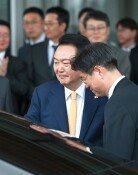Worsening ties between Seoul and Tokyo must not be left unattended
Worsening ties between Seoul and Tokyo must not be left unattended
Posted October. 25, 2019 07:44,
Updated October. 25, 2019 07:44
South Korean Prime Minister Lee Nak-yeon had a meeting with Japanese Prime Minister Shinzo Abe on Thursday, delivering a letter from President Moon Jae-in. The two prime ministers reaffirmed their commitment to resolve the various issues, stressing in unison that “as two important neighbors, South Korea and Japan must not leave the current difficult circumstances unattended.” The two shared their view on the importance of coordination between Seoul and Tokyo as well as the tripartite alignment between South Korea, Japan, and the U.S. in addressing North Korean issues. This marks the first time for the two countries to have a top-level meeting since October last year when South Korean Supreme Court ruled on the forced labor mobilized by Imperial Japan.
Prime Minister Lee urged an effort to facilitate various channels of communications and exchanges including dialogues at the ministerial level in order to resolve the current frictions between the two nations. “Promises between countries must be kept,” replied Mr. Abe, agreeing to continue to have communications between the foreign affairs authorities to tackle the issues quickly. “South Korea has respected and complied with the Treaty on Basic Relations between Japan and the Republic of Korea as well as claims agreements from 1965,” Lee further explained, dispelling Tokyo’s misgivings that Seoul is trying to deny the agreement in question, which is the foundation of their relations. Japan called the occasion a “meeting” instead of a “talk,” a sign that the two nations have finally yielded a breakthrough in dialogues in a long while.
The bilateral relations between Seoul and Tokyo were instantly frozen since the Korean court’s ruling on Japan’s forced labor. Japan said that the ruling is in violation of international law, as Korea’s claims are no long valid by the 1965 agreement, and the Korean government has maintained the stance that it cannot intervene with the judicial findings, citing separation of power. The dispute expanded further into the realms of economy and security, with the Japanese government imposing export restriction on Korea in early July and the Korean government fighting back by announcing an end to the General Security of Military Information Agreement, or GSOMIA, an intelligence sharing treaty with Japan, on August 22.
The issue of Japan’s forced labor and its ruling must be the starting point, but differences in stance remain. However, there is no doubt that both South Korea and Japan will lose out from the prolonged strains on relations. As Seoul is making its share of effort to find a solution, Tokyo needs to recognize such effort and assume a more positive point of view.
It is also vital to arrange a summit meeting between Moon and Abe at the earliest opportunity. Multi-lateral meetings such as the ASEAN+3 meeting in late October in Thailand and the APEC summit meeting on November 16 and 17 in Chile should be possible venues for the two heads of state to meet. It is since September that Mr. Lee has emphasized the need to restore the intelligence sharing pact and lift Japan’s export restrictions. Seoul and Tokyo must find a “grand solution” to address the two issues at the same time while devising a way to resolve the disputes over the court ruling on Japan’s wartime forced labor.







